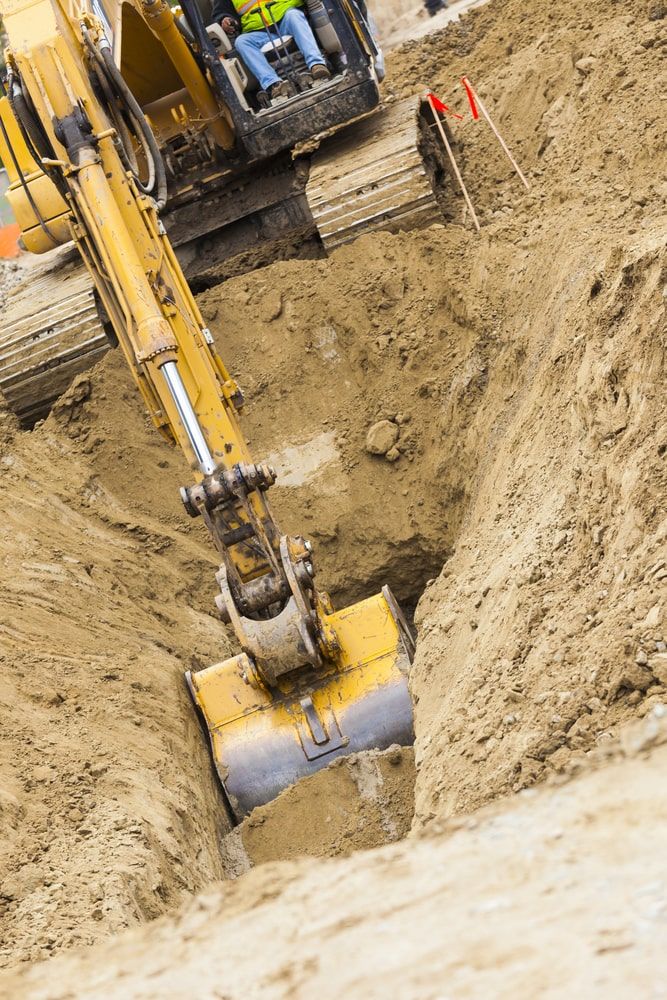Excavating Ohio - Top Excavation Specialists for Ohio Projects
Excavating Ohio - Top Excavation Specialists for Ohio Projects
Blog Article
Comprehensive Excavation Methods: Mastering the Basics for Success
In the world of building and construction and civil engineering, the importance of efficient excavation strategies can not be overstated. The mindful planning, specific implementation, and precise focus to detail required in excavation tasks require a comprehensive technique that incorporates various basic elements. From first dirt evaluation to the execution of safety and security measures and normal progress tracking, understanding these core components is necessary for accomplishing success in any excavation undertaking. Nonetheless, the true mastery exists not just in recognizing these fundamentals but in seamlessly integrating them to navigate the complexities of excavation projects with finesse.
Recognizing Excavation Job Preparation

The preliminary stage of any excavation task is the planning phase, where important choices are made that can dramatically impact the end result of the project. Understanding the project timeline, range, and spending plan constraints is vital for creating a thorough excavation strategy that makes sure the job's success.
One secret aspect of excavation task preparation is the development of a thorough timeline that details the series of target dates, activities, and landmarks. This timeline works as a roadmap for the job group, enabling them to track progress and make necessary adjustments to make sure the project stays on timetable. Additionally, a well-defined budget plan that makes up all expenditures, consisting of equipment service, labor expenses, and products, is crucial for avoiding cost overruns and delays. By thoroughly considering all these elements throughout the preparation stage, excavation jobs can be executed successfully and properly, bring about successful outcomes.
Dirt Analysis and Site Evaluation
Performing extensive dirt evaluation and website examination is a crucial action in the preparation phase of any kind of excavation project. Soil evaluation entails determining the make-up, structure, and buildings of the soil at the excavation site. This details is critical for comprehending the dirt's bearing capability, wetness content, and potential for erosion, which are key factors in establishing the excavation techniques and tools required for the task.
Website evaluation surpasses soil evaluation and encompasses a broader analysis of the general site conditions. This evaluation includes identifying any potential risks, such as underground utilities, ecological problems, or unpredictable surface, that might affect the excavation process. By completely reviewing the website, task supervisors can establish efficient excavation techniques that prioritize safety, performance, and environmental management.
Using advanced technologies like ground-penetrating radar, dirt tasting, and drone surveys can enhance the precision and effectiveness of soil evaluation and website assessment. Investing time and sources in these preliminary steps can inevitably conserve time and avoid costly hold-ups or issues during the excavation procedure.
Tools Selection and Utilization
Reliable excavation jobs rely greatly on calculated equipment option and use to make certain optimum efficiency and efficiency. Choosing the ideal equipment find out here now for the job is essential in optimizing efficiency and decreasing downtime. Aspects such as the type of dirt, deepness of excavation, and job extent play a considerable role in determining the most suitable equipment for the task available.

In addition to picking the suitable tools, proper usage is key to task success. Operators has to be educated to take care of the equipment securely and effectively - lancaster trenching. Routine upkeep checks and prompt repair work assist protect against failures and ensure consistent efficiency throughout the job
Precaution and Rules Conformity
In the world of excavation tasks, focusing on security steps and compliance with regulations is extremely important to making sure a legally sound and protected operational environment. Safety procedures encompass a series of techniques, including conducting detailed site assessments, applying appropriate signage and obstacles, and providing adequate safety and security training for all employees involved in the excavation process. Adherence to regulations, such as OSHA needs in the United States, ensures that the excavation project fulfills the necessary criteria to safeguard employees, onlookers, and the surrounding setting.

Tracking Progression and Adjusting Methods
Just how can predict managers successfully track the development of excavation tasks and adjust their techniques accordingly to maximize results? Monitoring progression is crucial for making sure that excavation projects remain on track and satisfy deadlines. Task managers can make use of different tools and strategies to track progress, such as day-to-day development records, routine site assessments, and advanced tracking technologies like drones and GPS tracking systems. By continuously monitoring the job's advancement, supervisors can identify any type of potential delays or concerns at an early stage and take aggressive steps to resolve them.

Final Thought
Finally, mastering the fundamentals of thorough excavation strategies is important for the success of any task. By understanding project preparation, assessing soil and site problems, choosing ideal equipment, abiding by safety regulations, and monitoring development, task supervisors can guarantee a smooth and efficient excavation procedure. Implementing these strategies will lead to successful results and decrease potential threats or problems throughout the excavation project.
The first phase of any type of excavation project is the preparation stage, where important choices are made that can dramatically impact the end result of the project. Recognizing the project timeline, budget plan, and range restrictions is important for developing a comprehensive excavation strategy that ensures the project's success.
Just how can predict managers effectively track the advancement of excavation jobs and adjust their strategies appropriately to maximize end results? By carefully keeping track of progression and being willing to adapt methods, task supervisors can improve the overall success of excavation jobs.
By recognizing task preparation, examining soil and site conditions, choosing ideal devices, complying with security policies, and keeping an eye on progression, task supervisors can make sure a smooth and reliable excavation process.
Report this page